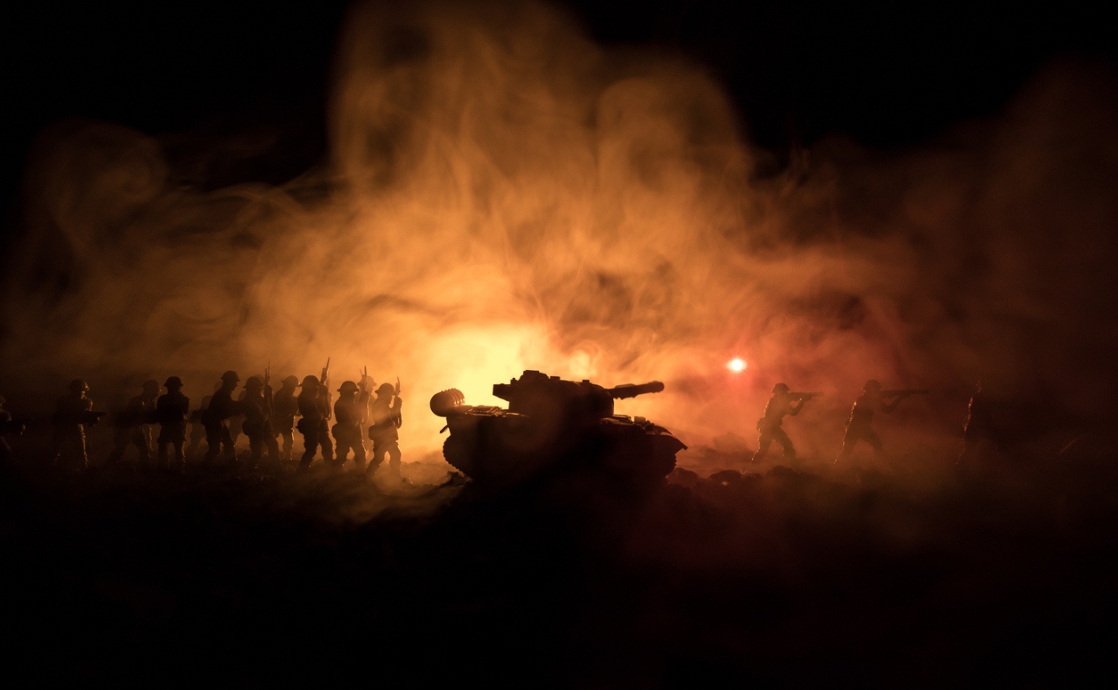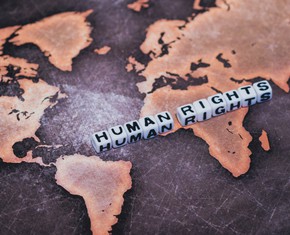The views expressed in our content reflect individual perspectives and do not represent the authoritative views of the Baha'i Faith.
As long as I can remember, since I was a child, I have been fascinated with war. Maybe that came from movies glorifying, romanticizing, and praising soldiers as heroes.
In those films, the protagonist is usually a morally guided man who destroys evil while showing great courage in the face of grave danger.
RELATED: The Baha’i Warnings about World War
Hollywood does an excellent job of showing only one side of the coin, though. We all know that the true reality of war is far from what humanity could ever accept as moral, humane, or good. If we understood the true causality of war, we would all rise up and demand that our elected officials do everything in their power to stop this pointless cycle of senseless, inhumane violence.
Before I became a Baha’i, I fought a war — so when I contemplate war from a firsthand perspective, I am truly perplexed by how animalistic and brutal humans can become. Abdu’l-Baha, the son and successor of Baha’u’llah, the prophet and founder of the Baha’i Faith, said this about such misguided souls:
… if the spiritual qualities of the soul, open to the breath of the Divine Spirit, are never used, they become atrophied, enfeebled, and at last incapable; whilst the soul’s material qualities alone being exercised, they become terribly powerful — and the unhappy, misguided man, becomes more savage, more unjust, more vile, more cruel, more malevolent than the lower animals themselves. All his aspirations and desires being strengthened by the lower side of the soul’s nature, he becomes more and more brutal, until his whole being is in no way superior to that of the beasts that perish. Men such as this plan to work evil, to hurt and to destroy; they are entirely without the spirit of Divine compassion, for the celestial quality of the soul has been dominated by that of the material.
I lived that reality. During my combat tour in Iraq, I learned that control is in the hands of the Creator and that the illusion of control prevents people from trusting God. Rather than allowing life to happen on life’s terms, we decide to try to take control, yet the truth is that the only thing we can control is our behavior and our attitude. Our deeds and our lives are a reflection of both.
I know that taking life and possessions by force is not truth, just as I know that telling a lie is not truth. I know that evil is evil and good is good. Take my word for it — to kill is pure evil, and to love is pure good. The common faculty of reason allows us to unite these truths into one accepted and universal truth: that war is pure evil and that those who fight wars create their own hell. Hell is the absence of life, a place where people fight and kill for material gain.
War spares no life; even innocent children and animals suffer. War destroys the environment, and all the vibrations of hatred it produces spread across the world, shaking life to its core. How futile are men’s attempts to seize what can never be theirs? They fight day and night for a piece of land, a mere plot of dirt. Unknown to them, they fight only for their own tombs. They create a false illusion that everyone around them is their enemy, that everyone wants to kill them. They decide that killing others first will secure their place on this Earth.
Thomas Merton, a great modern-day philosopher, encapsulated the essence of war:
At the root of all war is fear: not so much the fear men have of one another as the fear they have of everything. It is not merely that they do not trust one another; they do not even trust themselves. If they are not sure when someone else may turn around and kill them, they are still less sure when they may turn around and kill themselves. They cannot trust anything because they have ceased to believe in God. It is not only our hatred of others that is dangerous but also and above all our hatred of ourselves: particularly that hatred of ourselves which is too deep and too powerful to be consciously faced. For it is this which makes us see our own evil in others and unable to see it in ourselves.
The Baha’i teachings offer humanity profound insights into the inevitable consequences of war and conflict. Abdu’l-Baha wrote:
… war is destruction while universal peace is construction; war is death while peace is life; war is rapacity and bloodthirstiness while peace is beneficence and humaneness; war is an appurtenance of the world of nature while peace is of the foundation of the religion of God; war is darkness upon darkness while peace is heavenly light; war is the destroyer of the edifice of mankind while peace is the everlasting life of the world of humanity; war is like a devouring wolf while peace is like the angels of heaven; war is the struggle for existence while peace is mutual aid and cooperation among the peoples of the world …
Baha’u’llah emphasized that war is a manifestation of humanity’s failure to recognize the unity and sanctity of life.
The ability of men to choose war stems from the serious misunderstanding that this world and this life belong solely to them. Leaders of nations and armies plot ways to seize what is not theirs and invent devices of cruelty that bring pain and suffering to others. This is driven by an insistent ego and pride which creates fantasies of domination and conquest disconnected from reality.
In war, suffering and death are the only outcomes. There is no peace at the end of a war. The idea that war’s end goal is peace overlooks the fact that peace already exists, and that war is a product of our selfish desires.
Baha’is believe, however, that humanity can and will have peace. A lasting global peace, the Baha’i teachings say, is not only possible but ultimately inevitable. Baha’u’llah said that
… these ruinous wars shall pass away, and the ‘Most Great Peace’ shall come .… These strifes and this bloodshed and discord must cease, and all men be as one kindred and one family.
This suggests that peace is a state humanity must strive for, rather than a consequence of war.
So why do we fight? The answer is simple: people fight either to take or to defend. Some are coerced into war by the fantasy of fighting evil or the savagery of others, or some by the gluttony of a single man. In the end, people can never find balance within themselves or understand each other by killing one another. Rather than communicate, they choose to kill what they perceive as a threat. This creates an illusion that others do not think like them, which drives them to act first to secure their survival. This is not only insanity but a profound failure to grasp our true purpose.
RELATED: How We Can Really Talk About War and Peace
But I’m consoled by what Abdu’l-Baha said in the Baha’i magazine Star of the West when he addressed the fate of young soldiers who have fallen in war:
God treats these people with His mercy, not with His justice, since God is against war. As many did not will the war but were obliged to go to the battlefield by force of circumstances, therefore God has mercy, for they suffered much and lost their lives. They deserve the forgiveness of God and will be rewarded.
We were not created to fight in wars, the Baha’i teachings assure us — we were created to help advance an ever-progressing civilization. We fight because we have lost our way, finding ourselves in a dark wood, the straight path lost. When we kill or blindly allow wars and killing to continue, we have lost connection with ourselves and others. We fight because we do not know where to find the truth, misguided by those who claim to possess it.
As my son Julius once said, “Dad, those who say they are the most awake are usually the ones in the deepest sleep.” This blind adherence to the traditions, dogmas, and fantasies of war has created an inescapable cycle of hate and evil. Baha’u’llah’s spiritual teachings of unity, justice, and peace have come to stop that cycle.
You May Also Like
Comments

















We need some mandatory service for those in their late teens or early twenties, military, peace corps, some thing: meet and work with people from all over the country. No exceptions, all grunts. And again tax wealth not people. As we used to do, the top one ...percent income bracket at 90 per cent. But that is gone. We need to do it again. Pardon my ramble. Your question and answer got me going. There are more obvious changes we need to make. Peace.
Sometimes preparing the old one is more expensive than to destroy and build a new one! As long as violence is permitted in old religions, we will see wars in different form. If you kill one or if you kill one million, you are A murderer. And the punishment is the same “ death “. People are constantly at war as long as they don’t believe in life after this life. Time ...to have fun becomes limited. So, the word is MONEY!